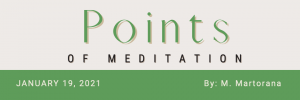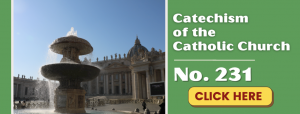Tuesday of the Second Week in Ordinary Time

“For greater things you were born.” (Ven. Mother Luisita)
TUESDAY, JANUARY 19th Mk. 2: 23-28 “The Son of Man is Lord even of the Sabbath.”
- CCC 1167: When we ponder, O Christ, the marvels accomplished on this day, the Sunday of your holy Resurrection, we say: Blessed is Sunday, on Sunday heaven and earth rejoiced and the whole universe was filled with light. Blessed is Sunday, for on it were opened the gates of paradise so that Adam and all the exiles might enter it without fear.
SUNDAY, THE SABBATH DAY (Excerpt) by Fr. John Hardon, S.J.
With the coming of Christ, the third Commandment was elevated by Jesus, further by the apostles, and finally by the Church. The day from the first century was changed from Sabbath or Saturday, to Sunday; and this mainly for two reasons. First, because Christ chose to rise from the dead on Sunday. There could have been no more dramatic way for Christ to close the Old Testament and institute the New than by lying in the grave all Holy Saturday and rising from the dead on Sunday. Second, because God as the third Person of the Trinity chose to descend on the Apostles, the disciples, and Our Lady on Pentecost Sunday.
Sunday for us Christians is the day especially dedicated to the Holy Trinity – to God the Father as Creator, to God the Son as our Redeemer, and God the Holy Spirit as our Sanctifier. The Church made sure by the fourth century, and the obligation has not changed, and will not change until the end of time, it is a grave obligation for every Catholic to assist at Mass on Sunday.
The Third Commandment prescribes abstention from work. Christianity from the beginning was not so rigid as were the Jews. This is crucial. What Christianity did besides changing the day from Sabbath to Sunday, Christianity also changed the focus. The concentration in Christianity is on the sanctification of Sunday, of devoting Sunday to God, without totally removing the obligation not to engage in labor on Sunday
Christ already during His public ministry more than once showed the change that he was introducing. He would deliberately choose to work some miracles, especially when there were enough Pharisees around, on the Sabbath. They complained and what He told them, and through them us, is that you may know that the Son of man is the Lord of the Sabbath. Then He proceeded to scandalize the Pharisees and work another miracle. He even asked the Pharisees, “Is it all right to do a good work, a work of charity on the Sabbath?” As far as the Pharisees were concerned, you don’t even ask a man to pick up his mat on Saturday.
What then is the Church’s teaching, and I want to emphasize this, the law; Sundays and Holy Days of Obligation are meant to be days of rest. But they are to be days of rest as the Church interprets or explains it. First, and from the beginnings of Christianity, the Church has always distinguished two kinds of work. What we now call servile work and for want of a better word, non-servile work.
What is servile work? Servile work is physical labor. Servile work is bodily labor. Now regarding servile work, it is that in which the body is more occupied than the spirit. That is the basic definition of servile work. And it’s that kind of work which the Catholic Church forbids on Sundays and Holy Days.
However, the Church again, from the very beginning, has always made distinctions; whether servile work is done out of necessity or charity. Secondly, servile work is not merely tolerated but permitted, even praised by the Church, if it is either necessary or done out of charity. And Christ as we said before, dramatized what He was doing by performing works of charity by healing the sick or the paralytics on the Sabbath.
Remember the lives of the saints where, after Mass on Sundays, they would go to the hospitals to take care of the sick. My secretary in New York had terminal cancer, and kind friends would come to her on Sundays and do some cooking that she could not do.
Regarding non-servile work, it is permitted on Sundays when the mind is more occupied than the body. Like thinking; we are not to stop thinking on Sundays. Like writing, you cannot write without thinking. Writing, teaching, preaching, and with emphasis, praying.
Last but not least, Sundays every faithful Catholic should pray, and pray more intensely!
NOW SOME RECOMMENDATIONS.
Number One. Sundays are to be a witness to our faith; our faith in God as our Creator; our faith in God become man as our Savior; our faith in God as our sanctifier. All of this is locked up in our observance of Sundays. Sundays not only may be or should be, but must be different.
Number Two. Sundays are days of special graces from God. No question about it. God reserves graces that He will give us only if and when and insofar as we honor His day as He wants us to.
Number Three. What the Third Commandment spells out for us is the necessity of the Mass in our lives. That at least this one day a week we must go to Mass. Why? Because the Mass, faith tells us, is necessary for our salvation.
Number Four. Our age is the age of martyrs. We are living in the age of unbelief. Sundays are marvelous for professing our faith! They are all around us: people who couldn’t care less.
Number Five – Read the story of Our Lady of LaSallete. Read it and weep. The principle message was pleading with the people to restore Sunday as the day dedicated to the Lord, otherwise dire consequences will follow.
Number Six – According to Saint Pope John 23rd, the single most specific, concrete, definite and fundamental reformation needed in the Catholic Church is to respect the sanctification of Sunday. And who in his right mind would question that the Catholic Church needs reformation?
Lord Jesus, you chose to rise from the dead on Easter Sunday and your Church ever since has identified Sunday with your day, the Lord’s Day. It was the day on which you proved to the world that you are the Master of sin and death. Now you want us, dear Lord, to commemorate, celebrate, and live our faith by sanctifying Sunday as your day. Amen.
Copyright 2021 Oblates of the Virgin Mary
St. Peter Chanel Church, Hawaiian Gardens, CA

